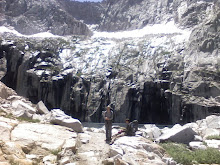In the last decade increasing evidence made its way into the popular media regarding a phenomenon in the Gulf of Mexico: the Dead Zone.
A dead zone is an area of marine ecosystem relatively devoid of life, hence: "dead"; this abiotic situation is usually attributed to a lack of dissolved oxygen, an elemental limiting factor required by both people and pisces.
The origin of a dead zone is a great ecological paradox; it is caused by too many nutrients in the water. As we began to put down our cell phones and pick up our notepads we began to unravel a forensic event in geographic scale. Farmers, subsidized by cheap petroleum-based fertilizer (primarily nitrates) found it easier to apply this artificial nutrient to their corn crops than to go through the arduous task of organically growing their cash-crop in a sustainable manner. Since this form of nitrogen is very water-soluble, that which is left over is flushed by the next inundation, so farmers err on the side of plenty. Unfortunately all rivers tend to lead to the sea, in this case the Gulf, and with the water flows massive amounts of artificial fertilizer.
So how can fertilizer kill fish? Is it toxic to them?
Not at these levels. No, one must think "macrosystems", the big picture of how organisms interact within an ecosytem. Nutrients are by definition nutritional, so what would benefit from all this nitrogen in the water world? Water plants, obviously.
"Wait-- water plants kill fish?"
Sort of...
Algae love fertilizer, and algae are photosynthetic, which produce oxygen as a by product... so wouldn't artificial fertilizer actually increase the amount of oxygen available to fish? At one glance, certainly.
So what's the problem?
It's artificial.
Meaning, that naturally this much nitrogen is not available on a continuous basis. Algae do not have bank accounts or purchase commodity futures; algae only know "grow and multiply" if there is much nutrition, stabilize if there is just the right amount of fertilizer, or die if there is not enough nutrients to support its population. Any kid who tried to raise a garden can appreciate this.
So what would happen if someone started messing with the levels of nutrients? Bingo!
When all that excess nitrogen hits the aquatic ecosystem, the algae respond like it's springtime all over again and "bloom" into massive population growth. But wait, the farmer stops putting fertilizer on his corn, which now cuts off this waiting mass of downstream phytoplankton, so the algae die off. Nature knows what to do with dead things-- it's called decomposition, and the critters beautifully designed for the job are bacteria. Though there are some exceptions, bacteria are excellent at quickly breaking down dead stuff as long as there is oxygen present in the water. In time the bacteria use up all the oxygen trying to decompose the dead algae that previously bloomed because a farmer used too much federally subsidized, petroleum-based fertilizer to grow a poor food stock for federally mandated ethanol, and now nothing can grow in large regions of the Gulf. So instead of using petroleum products to fuel our vehicles, we use petroleum products to grow our additives, which is then mixed back in with the other petroleum distillates, but now at a larger ecological cost, all in the name of saving the planet.
So in reduction, corn kills. Awesome.
I think that's funny.
I also think it is a metaphor (OK, fine-- to me, everything is a metaphor!)
How often, in trying to be productive in one part of our lives, do we completely trash something else entirely unexpectedly?
And how often in peoples lives does "plenty" result in "devastation"? Proverbs 23 warn us to hold a knife to our own throats when dining with affluent people, because you might develop a taste for their delicacies.
How often do we come away from encounters feeling emptier because of envy? How often do we lose perspective of the blessings we have already received, because a spirit whispers "more" into our contentment?
And why do I feel these dead zones in my own soul, these anoxic nether-regions that persist even though I know the joy of Christ's salvation?
How can I be dead inside? I feel nothing. I hope for nothing. I expect nothing outside of the present, and in that: that God would not leave me in this my final hour.
Subscribe to:
Post Comments (Atom)

No comments:
Post a Comment